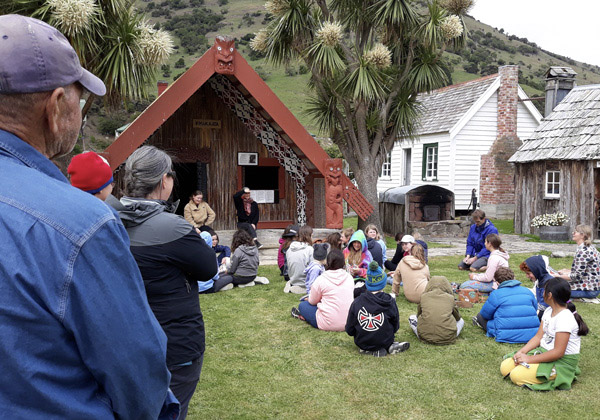
Okains Bay Museum
<p>A trip to a museum should be high on the list, then.</p>
<p>With modern museums offering much more than a ticket in, teachers are no longer tasked with producing print-outs, name badges, and no longer need to transform into an expert on any given subject matter at the drop of a hat.</p>
<figure id="attachment_23461" aria-describedby="caption-attachment-23461" style="width: 681px" class="wp-caption aligncenter"><img class="size-large wp-image-23461" src="https://www.schoolnews.co.nz/wp-content/uploads/2022/08/Okains-Bay-Museum-4-681x1024.jpg" alt="" width="681" height="1024" /><figcaption id="caption-attachment-23461" class="wp-caption-text">Okains Bay Museum</figcaption></figure>
<p>Museums are a boon for learning experiences, and the museum trip itself is a joy for EOTC-weary teachers.</p>
<h4><a href="https://www.schoolnews.co.nz/latest-print-issue/" target="_blank">Click to read our Term 3 print issue, out now!</a></h4>
<p>Whatever the theme, location, or history of a museum, experiencing learning in an information-rich, unfamiliar environment submerges students and staff in something new – together. It provides a perspective that cannot be taught from the familiar comfort of the classroom. Being in a stimulating new environment can fuel the imagination, trigger new ideas and sometimes break habits in thinking or behaviour.</p>
<p>By taking learning experiences out of the classroom and into the museum, you are able to allow your students to become immersed in the subject matter to enhance what they have learned, or will go on to learn, at school. Not only are your students able to better visualise and experience the learning topics, but they can also hear from experts to deepen their understanding and hear different perspectives. World views and general knowledge are also expanded along with subject knowledge.</p>
<figure id="attachment_23459" aria-describedby="caption-attachment-23459" style="width: 1024px" class="wp-caption aligncenter"><img class="size-large wp-image-23459" src="https://www.schoolnews.co.nz/wp-content/uploads/2022/08/Waitangi-Education-33-1024x684.jpg" alt="" width="1024" height="684" /><figcaption id="caption-attachment-23459" class="wp-caption-text">Waitangi Education</figcaption></figure>
<p>Getting to know your students better and allowing them to get to know you can be one of the most valuable offshoots of such trips. As well as the travel there and back, being in a museum environment allows interaction to take place directly on the subject matter, as well as more broadly.</p>
<p>Students see their teachers engaged in learning and the growth mindset is being modelled. Developing personal connections will create building blocks for future learning, creating better motivation for both student and teacher. Relationships among students and between students and staff are strengthened and new bonds formed.</p>
<figure id="attachment_23458" aria-describedby="caption-attachment-23458" style="width: 1024px" class="wp-caption aligncenter"><img class="size-large wp-image-23458" src="https://www.schoolnews.co.nz/wp-content/uploads/2022/08/Waitangi-Education-11-1024x684.jpg" alt="" width="1024" height="684" /><figcaption id="caption-attachment-23458" class="wp-caption-text">Waitangi Education</figcaption></figure>
<p>Having experts on hand to guide your group will likely be a Godsend, and not just as a chance for passing on the paperwork for a change. Letting museum staff lead the learning will provide an opportunity for all to listen to a new knowledgeable voice and experience an alternative teaching style and fresh perspective in a fresh environment. You’ll all learn.</p>
<p>Your teaching practice will likely also benefit from needing to cater to individual students differently, in a different environment. From the practical, hands-on learners that thrive outside the classroom to the academically confident kids welcoming the chance to shine, and the less extroverted ones being exposed to new challenges and <a class="wpil_keyword_link" href="https://www.schoolnews.co.nz/2015/10/developing-opportunities-at-school-with-a-view/" title="opportunities" data-wpil-keyword-link="linked" target="_blank">opportunities</a> for growth, each student can find their place at the museum.</p>
<p>Presenting stimuli, often with attractive, tech-focused ways to encourage interaction is what museums do. Information will often be presented in ways that even the greatest of teachers will find hard to compete with for their learners’ attention and won’t want to try!</p>
<figure id="attachment_23432" aria-describedby="caption-attachment-23432" style="width: 1024px" class="wp-caption aligncenter"><img class="size-large wp-image-23432" src="https://www.schoolnews.co.nz/wp-content/uploads/2022/08/c-James-Jiao-Adobe-Stock-1024x683.jpeg" alt="" width="1024" height="683" /><figcaption id="caption-attachment-23432" class="wp-caption-text">Image copyright: Adobe Stock, James Jiao</figcaption></figure>
<p>It follows that students are likely to retain more information from an interactive, hi-tech exhibit, for example, than an in-class projector presentation. The informal learning environment of the museum also allows for impromptu learning moments and self-guided experimentation, perfect for those who prefer learning by doing.</p>
<p>Whether schools are looking for ways to better integrate arts, history, science, technology or sports, museums can provide a deep dive into a subject area like nothing else can. Tailored education programmes for school groups are pedagogy-informed, and encourage inquiry and student-led learning in ways that tie into the curriculum, all the while making life easier for school staff and the inevitable parent helpers.</p>
<p>And museums’ help extends way beyond the actual subject matter learning – they are well-versed in helping with the other considerations such as staff-to-student ratios, catering, transport, and health and safety. They know what goes into planning a school visit to the museum and can take the headache out of it for you—they also know the curriculum well and can offer advice and suggestions for future planning around travelling exhibits and upcoming collections.</p>
<p>You may find yourself resource-rich both pre- and post-trip, with museum-curated education programmes now consisting of tools and treasures that stretch beyond the basic photocopied worksheets of old and include digital resources, activities and access to online catalogues. Museum staff are also excellent researchers, who can encourage students to develop their own research skills by exploring online collections as well as the physical exhibits.</p>

EXCLUSIVE: Teachers used to be paid two to three times more than minimum wage workers,…
After an “overwhelming” vote to reject the latest Government offer, secondary school teachers will begin…
Second-language learning should be compulsory, says a new report from a forum bringing together academics,…
A new entitlement aimed to improve access to learning support coordinators for schools with students…
Educators have raised questions about the Ministry of Education’s new secondary school subjects, set to…
Professional learning and development (PLD) for teachers needs to be higher impact for teachers and…
This website uses cookies.